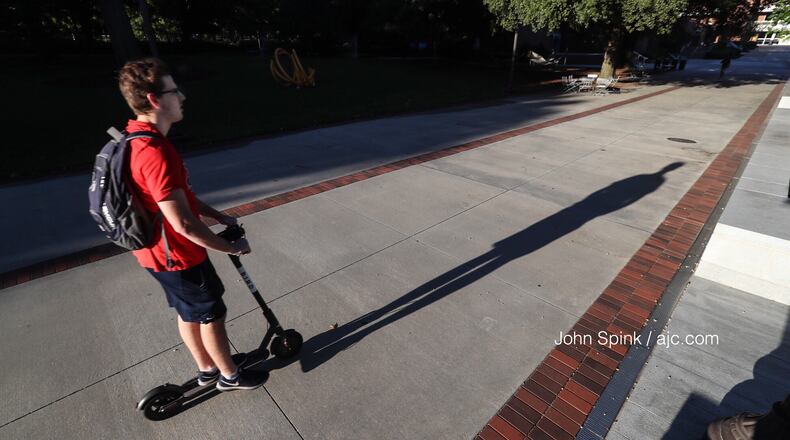To supporters, they’re an inventive, convenient way to get around the city without much of a carbon footprint. To critics, they’re critters that litter Atlanta’s sidewalks, posing a danger to pedestrians, drivers and the people who use them.
Love ‘em or hate ‘em, those dockless scooters that popped up around Atlanta earlier this year could soon be officially regulated by the City of Atlanta.
“These scooters appeared one day and took the city by storm,” said Councilor Michael Julian Bond, the lead sponsor of new legislation.
At a City Council public safety committee meeting Tuesday, the body discussed an ordinance that would set specific rules for where the scooters can be ridden and parked, and implement permit requirements that could net tens of thousands of dollars for the city. The committee voted to hold the bill for now, before it is potentially voted on by the full Council.
The dockless scooter trend has exploded across the country and the world over the past year, reaching cities in more than 25 states as well countries such as Mexico, France and Israel. In some cities like San Antonio and Richmond, the scooters have been met with backlash, and city crews reportedly took to the streets and removed the devices themselves.
Around intown Atlanta, the scooters, operated by California-based companies Lime and Bird, are hard to miss. A Bird representative told the City Council on Tuesday that Atlanta is the company’s second-largest scooter city globally (behind San Diego), and that there are currently over 1,500 Bird scooters deployed here.
They are dockless and electric, meaning they rev up to about 15 mph and can be left virtually anywhere for the next rider. All it takes is a smartphone app to start a relatively inexpensive ride, which costs a $1 flat fee and 15 cents for each additional minute. (Overnight, a team of local employees drives around to pick up and charge the devices.)
On a recent afternoon outside a restaurant near the Beltine, a group of friends squealed “Birds!” as they hopped on a row of the sleek black scooters that awaited them on the sidewalk. Among the group, Marietta resident Kate Noble said it was her first time riding one of the scooters in Georgia.
“Especially in a city like Atlanta, where you’ve got the BeltLine and you’ve got things that connect, I think it’s a fun way to get around,” Noble said.
The current legislation, which would go into effect Jan. 1, sets a $12,000 annual fee for a company to operate 500 scooters, and a $50 fee for every additional device.
It also mandates that the scooters are technically not allowed to ride on sidewalks. This, Bond stressed, is thanks to state law, which prohibits motorized devices from driving on Georgia sidewalks.
Regardless, it highlights the tricky middle ground the scooters have landed in. Since Atlanta is a notoriously car-heavy city, it's common to see scooter-riders defying the law and cruising down the sidewalks of busy streets like Monroe Drive or Peachtree Street.
Todd O’Boyle, Lime’s development director for the Southeast, said they surveyed riders on whether they use the street or the sidewalk.
“Riders consistently reported that if they ride on the sidewalk, it’s because they didn’t feel safe on the streets,” O’Boyle said.
Inman Park resident Stephanie Thomas worries that scooter riders who are afraid to cruise on the streets could be a danger to pedestrians on sidewalks. Thomas said she was leaving her pedicure appointment on North Highland Avenue earlier this summer when a person on a scooter zipped by, brushing her shoulder.
“If he had been any closer, he would’ve hurt me,” Thomas said. “He never even looked back. That was very frustrating.”
Electric scooters have also been linked to a number of crimes in the city, including a shooting downtown and harassment and theft in Midtown, according to police, though they said there is no direct link between the scooters and crime.
Under the current rules, the scooters are technically not allowed on the BeltLine, though it appears this has not been widely enforced — it’s rare to take a stroll on the BeltLine and not pass fleets of Birds or Limes. The new ordinance would clarify that the scooters can ride on the BeltLine and in city parks.
With an average trip time of 10 minutes, Lime riders in Atlanta take longer scooter treks than people in other major American cities, O’Boyle said.
“People are riding scooters really from one pocket of density to another,” he said. “We really are seeing that people are using this to use their transportation needs,” he said.
O’Boyle and others herald the scooters as an antidote that could help alleviate the metro area’s traffic problems, but it remains to be seen whether the two-wheeled devices are a potential solution, or if they will only become another vehicle on the road complicating the lives of Atlantans.
“We want to give people as many options as possible to live less auto-dependent lives, and that is core to our operation,” he said.
While the scooters are currently confined to the City of Atlanta, they could likely show up soon in other pockets of the metro area.
O’Boyle said Lime has seen interest from neighboring communities like Brookhaven, and while he doesn’t expect any expansion announcements soon, he “wouldn’t be surprised if we’re there in the near future.” The City of Brookhaven confirmed that it is “working with the industry” to develop policies for the devices.
About the Author
The Latest
Featured



